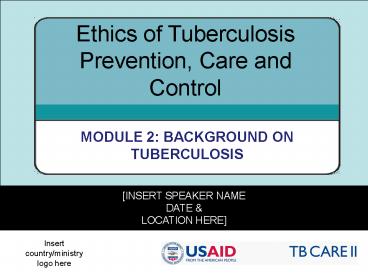[insert Speaker Name - PowerPoint PPT Presentation
1 / 9
Title:
[insert Speaker Name
Description:
Objectives. Upon completion of this module, you will be able to: Understand the global burden of TB-related disease. Describe why a human-rights, person-centred ... – PowerPoint PPT presentation
Number of Views:72
Avg rating:3.0/5.0
Title: [insert Speaker Name
1
Ethics of Tuberculosis Prevention, Care and
Control
MODULE 2 BACKGROUND ON TUBERCULOSIS
insert Speaker Name Date Location here
Insert country/ministry logo here
2
Objectives
- Upon completion of this module, you will be able
to - Understand the global burden of TB-related
disease - Describe why a human-rights, person-centred
approach should be applied in the management of
TB
3
Background
- Estimated 9 million people who developed TB in
2013 - 56 in South-East Asia and Western Pacific
Regions - 25 in African Region
- Between 1990 and 2013
- 45 decrease in TB mortality rate
- 41 decrease in TB prevalence rate
WHO Global Tuberculosis Report 2014
4
Post 2015 Global TB Strategy
VISION
A TB-free world Zero deaths, disease and suffering due to TB
GOAL
End the global tuberculosis epidemic
MILESTONES FOR 2025
75 reduction in TB deaths (compared with 2015) 50 reduction in TB incidence rate (less than 55 TB cases per 100 000 population) No affected families facing catastrophic costs due to TB
TARGETS FOR 2035
95 reduction in TB deaths (compared with 2015) 90 reduction in TB incidence rate (less than 10 TB cases per 100 000 population) No affected families facing catastrophic costs due to TB
WHO Global strategy and targets for
tuberculosis prevention, care and control after
2015. 2015
5
Principles of post-2015 Global TB Strategy
- Government stewardship and accountability, with
monitoring and evaluation - Strong coalition with civil society organizations
and communities - Protection and promotion of human rights, ethics
and equity - Adaptation of the strategy and targets at country
level, with global collaboration
WHO Global strategy and targets for
tuberculosis prevention, care and control after
2015. 2015
6
WHO Guidance on Ethics of TB Prevention, Care and
Control
- Can assist National TB Programmes (NTPs), TB
service providers, policy makers, civil society
and other stakeholders in implementing TB
prevention, care and control efforts in an
ethical manner - Addresses a broad range of ethical issues that
arise in NTPs, ranging from informed consent and
isolation to health care workers rights and
obligations, and clinical and epidemiological
studies - Raises consciousness about ethics in TB control
and in practice
7
Goal of TB care and control programmes
- Achieve universal access to high-quality
diagnosis and patient-centred treatment - Reduce the human suffering and socioeconomic
burden associated with TB - Protect public health, including protecting poor
and vulnerable populations from TB, TB/HIV, and
MDR-TB - Support development of new tools and enable their
timely and effective use - Protect and promote human rights in TB
prevention, care and control
8
Objectives for comprehensive TB strategy
- Provide proper treatment of infected individuals
- Ensure prevention of new infections
- Effective care and control programme
- Infection control
- Vaccination
- Appropriate population screening
- Improvement in socio-economic factors known to
increase risk of TB
9
(No Transcript)































